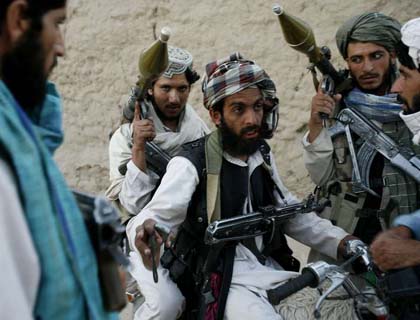The recent Taliban attacks targeting Western embassies and parliament in Kabul, and government buildings in other provinces on April 15 has caused a revived confidence, support and pride of ordinary Afghans for our National Security Forces. The fact that Special Forces units and police gunned down 36 terrorists with minimum ISAF air support and least civilian and security forces' casualties show the increasing capability of our forces, particularly the elite Special Forces units who are no less in performance than special operation forces of other regional countries.
It took the Special Service Group (SSG) of Pakistan Army nineteen hours to clear the Generals Headquarters in Rawalpindi when it came under attack in October 2009 by a group of nine militants. Nine commandos and three civilians were killed. Similarly, the bunch of LeT terrorists took Mumbai city hostage for three days killing 164 people in 2008 attacks. Of course the Afghan Forces cannot be compared, but we have to keep in mind that It has been just a decade that the Afghan Security Forces were established. The Special Forces units are as new as a few years. But they have been performing extraordinary.
There is a perception that our forces are being trained by the best military mentors—NATO—in the world, but the US strategy of building Afghan National Security Forces (ANSF) during the last ten years has had deep flaws, focusing quantity rather than quality. Even now with the rush of withdrawal strategy, they are still reluctant to build our Air Force and provide ANSF with best equipment. The Special Operations units have been trained well and we see the result. It is a separate topic to be addressed.
In the war of perception, the latest attacks in Kabul generated greater support for ANSF among ordinary Afghans. For the first time, I see volunteer youth groups campaigning to cover the walls of Kabul with billboards, posters and banners praising ANSF with pride. The larger public perception was reflected in media reports. The widespread photo of one commando with his bloodied knees after the fight with insurgents has emerged as a symbol of ordinary Afghan's pride and confidence in our troops. One particular photo viral on social media among Afghans portrayed something deeper than symbolic heroism. A photo of Taliban suicide bomber in women dressing was titled "Karzai's Brother", next to the photo of the wounded commando titled "Our Brother".
Actually it's not surprising that President Karzai, despite the continued bloodshed of militants, once again called them "brothers", just a day after the April 15 attacks. If I was a soldier with ANSF, I would wonder why I am fighting the "brothers" of my Commander-in-Chief.
In spite of all its problems of lack of professionalism and resources, the ideology and will to fight the enemy is the most important factor to hold our national security forces strong institutionally. Some analysts fear disintegration of ANSF after the US and NATO withdrawal in 2014 and our descent into chaos. With such a Commander-in-Chief, the concerns of fragility of our forces are very valid. When our President calls militants—who our forces are trained to fight—"brothers" in public, the definition of enemy gets blurred. And this cracks the very foundation of our security institutions.
When the news flashed on screens that Kandahar MP Naeem Lalai Hamidzai has taken position on the rooftop of parliament and fighting next to ANA troops against the militants who had stormed an under-construction building beside parliament, I was glad. I thought it was an important but symbolic public message of showing support to our forces by fighting beside them against the enemy.
However, later I watched the video of MP Lalai Hamidzai holding a machinegun, with a cup of green tea put beside him, opening burst of firing to every direction. A group of ANA soldiers and his private guards are laughing, while an officer on walky-talky urging the MP to stop firing as it could kill police who were engaged with militants inside the building, while one of Hamidzai's guards filming all this drama. Then I realized it was a publicity stunt, as stupid as the Taliban commander in Paktika who had turned self in for $100-reward on 'wanted' poster.
President Karzai's public remarks about his "brothers" are no surprise as he does not trust ANSF. Former NDS Chief Amrullah Saleh in an excellent analysis of politicization of our security forces on BBC Farsi has written; "When the president ventures out to pay a visit to a unit of the national police, national army, or intelligence, his personal security detail, called the President Protection Service (PPS), disarms everyone in advance. It sends the message that the only loyal unit to the president and the system is the PPS, comprised of 750 people who guard and protect him."
The latest Taliban attack is a late reminder that our National Security Forces have been long deprived of the much-important, even if symbolic, public support. It is a reminder that we, ordinary Afghans, need to rally mass awareness campaign of support for our security forces, no matter if our President blurs the difference between "brother" and enemy.

